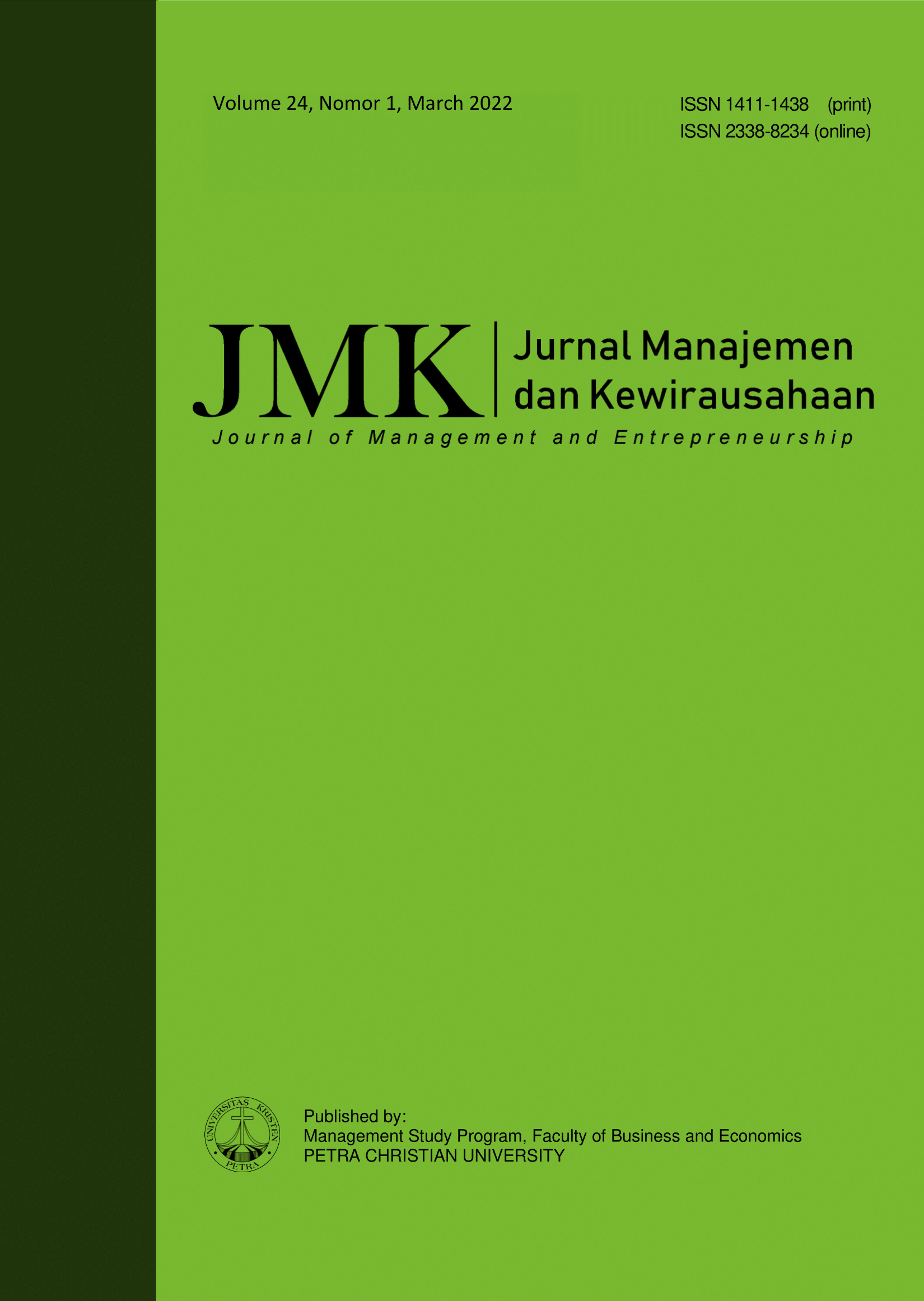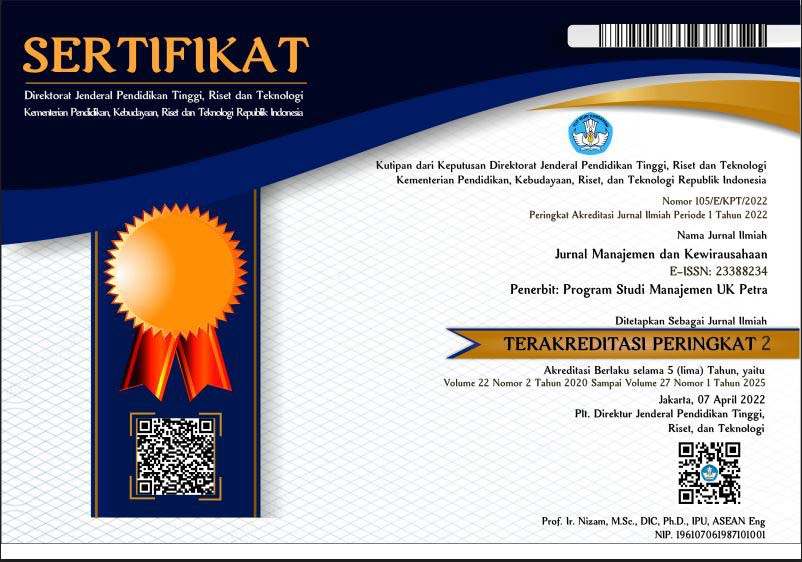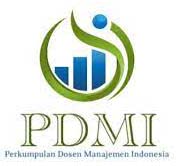KNOWLEDGE MANAGEMENT FOR QUALITY ASSURANCE INNOVATION IN THE OPERATIONS QUALITY ASSURANCE DIVISION OF BANK BAKTI KARYA PURNA
 :
:
https://doi.org/10.9744/jmk.24.2.138-158
Keywords:
Banking, operations, quality assurance, knowledge management, innovationAbstract
Bank Bakti Karya Purna was a pseudonym for a real bank in Indonesia. As the bank continued to expand, the operational function needs to enhance its capability to keep up. Accordingly, the Operations Quality Assurance division (Ops QA) was expected to innovate to redefine its role, whereby, in addition to its traditional role as Inspector, the organization has to assume two other roles of Guardian and Preventive Control Agent. This research was intended to assist Ops QA to meet management expectations. To overcome the knowledge and capability gaps discovered, this research proposed a knowledge management solution that provides actionable items within three knowledge management components of people, process, and technology to enable the innovation to achieve the Ops QA objectives.
References
Alavi, M., Kayworth, T. R., & Leidner, D. E. (2006). An empirical examination of the influence of organizational culture on knowledge management practices. Journal of Management Information Systems, 22(3), 191–224.
Afroze, R., Eva, T. P., & Sarker, M. A. R. (2019). A study on employability skills of engineering graduates. Journal of Intercultural Management, 11(3), 21–44.
APQC (2011). Knowledge management capability assessment tool. Retrieved May 27, 2022, from https://www.apqc.org/sites/default/file s/files/KMCAT_Webinar_Revised_201612.pdf.
Bank’s Annual Report (2020). Navigating through the challenge of growth. Jakarta.
Bank’s Internal Report (2021). Ops QA method and Ops QA Report. Jakarta.
Carneiro, A. (2000). How does knowledge manage-ment influence innovation and competitiveness? Journal of Knowledge Management, 4(2), 90–95.
Chang, W. J., Liao, S. H., & Wu, T. T. (2017). Relationships among organizational culture, knowledge sharing, and innovation capability: A case of the automobile industry in Taiwan. Knowledge Management Research and Practice, 15(3), 471–490.
Dalkir, K. (2005). Knowledge management in theory and practice. Oxford: Elsevier Butter-worth-Heinemann.
Deloitte (2013). Digital collaboration. delivering innovation, productivity, and happiness. Retrieved July 30, 2022, from https://www2. deloitte.com/content/dam/Deloitte/se/Documents/technology-media-telecommunicati ons/deloitte-digital-collaboration.pdf.
Deloitte (2016). Transitioning to the future of work and the workplace. Embracing digital culture, tools, and approaches. Retrieved July 30, 2022, from https://www2.deloitte. com/content/dam/Deloitte/us/Documents/human-capital/us-human-capital-transitioning-to-the-future-of-work.pdf
Drucker, P. F. (1999). Management challenges for the 21 Century. New York, NY: Harper Collins.
Du Plessis, M. (2007). The role of knowledge management in innovation. Journal of Knowledge Management, 11, 20–29.
Gault, F. (2018). Defining and measuring innovation in all sectors of the economy. Research Policy, 47, 617–622
Indarti, N. (2017). Impacts of external knowledge and interaction on innovation capability among Indonesian SMEs. International Journal of Business Innovation and Research, 13(4), 430–450. https://doi.org/10.1504/IJB IR.2017.085100
Hupic, V., Poulouch, A., & Rzevski, G. (2002). Towards an integrated approach to knowledge management: Hard, soft and abstract issues. Knowledge and Process Management, 19(2), 90–102.
Kikan, D., Singh, S., & Singh, Y. (2019). Predictive analytics adoption by banking and financial services: The future perspective. International Journal of Recent Technology and Engineering, 8, 832–837.
Lam, L., Nyguyen, P., Le, N., & Tran, K. (2021). The relation among organizational culture, knowledge management, and innovation capability: Its implication for open innovation. Journal of Open Innovation Technology, Market, and Complexity, 7(66), 1–16. https://doi.org/10.3390/joitmc7010066
Li, Z. B., Chaudhry, S. S., & Zhao, S. S. (2006). Designing ERP systems with knowledge management capacity. Behavioral Science and Systems Research, 23, 191–200.
Leber, M., Buchmeister, B., & Ivanisevic, A. (2015). Impact of knowledge on innovation process. In B. Katalinic (Ed.), DAAAM international scientific book 2015 (pp. 235–248). DAAAM Internatio-nal.
Lopes, I., Oliveira, A., & Costa, C. (2015). Tools for online collaboration: Do they contribute to improve teamwork? Mediterranean Journal of Social Sciences, 6, 512–517.
Magnier-Watanabe, R., Benton, C., & Senoo, D. (2011). A study of knowledge management enablers across countries. Knowledge management research & practice, 9(1), 17–28.
Shannak, R. O., & Masa'deh, R., & Akour, M. A. (2012). Knowledge management strategy building: Literature review. European Scientific Journal, 8(15), 143–168.
Streiner, D. L. (2003). Starting at the beginning: An introduction to coefficient alpha and internal consistency. Journal of Personality Assessment, 80(1), 99–103.
Tjakraatmadja, J. H., & Kristinawati, D. (2017). Stra-tegi implementasi knowledge management. Bandung: Penerbit ITB.
Downloads
Published
How to Cite
Issue
Section
License
Authors who publish on this journal agree to the following terms:
- Authors retain copyright and grant the journal right of first publication with the work simultaneously licensed under a Creative Commons Attribution License that allows others to share the work with an acknowledgement of the work's authorship and initial publication in this journal.
- Authors are able to enter into separate, additional contractual arrangements for the non-exclusive distribution of the journal's published version of the work (e.g., post it to an institutional repository or publish it in a book), with an acknowledgement of its initial publication in this journal.
- Authors are permitted and encouraged to post their work online (e.g., in institutional repositories or on their website) prior to and during the submission process, as it can lead to productive exchanges, as well as earlier and greater citation of published work (See The Effect of Open Access).


















